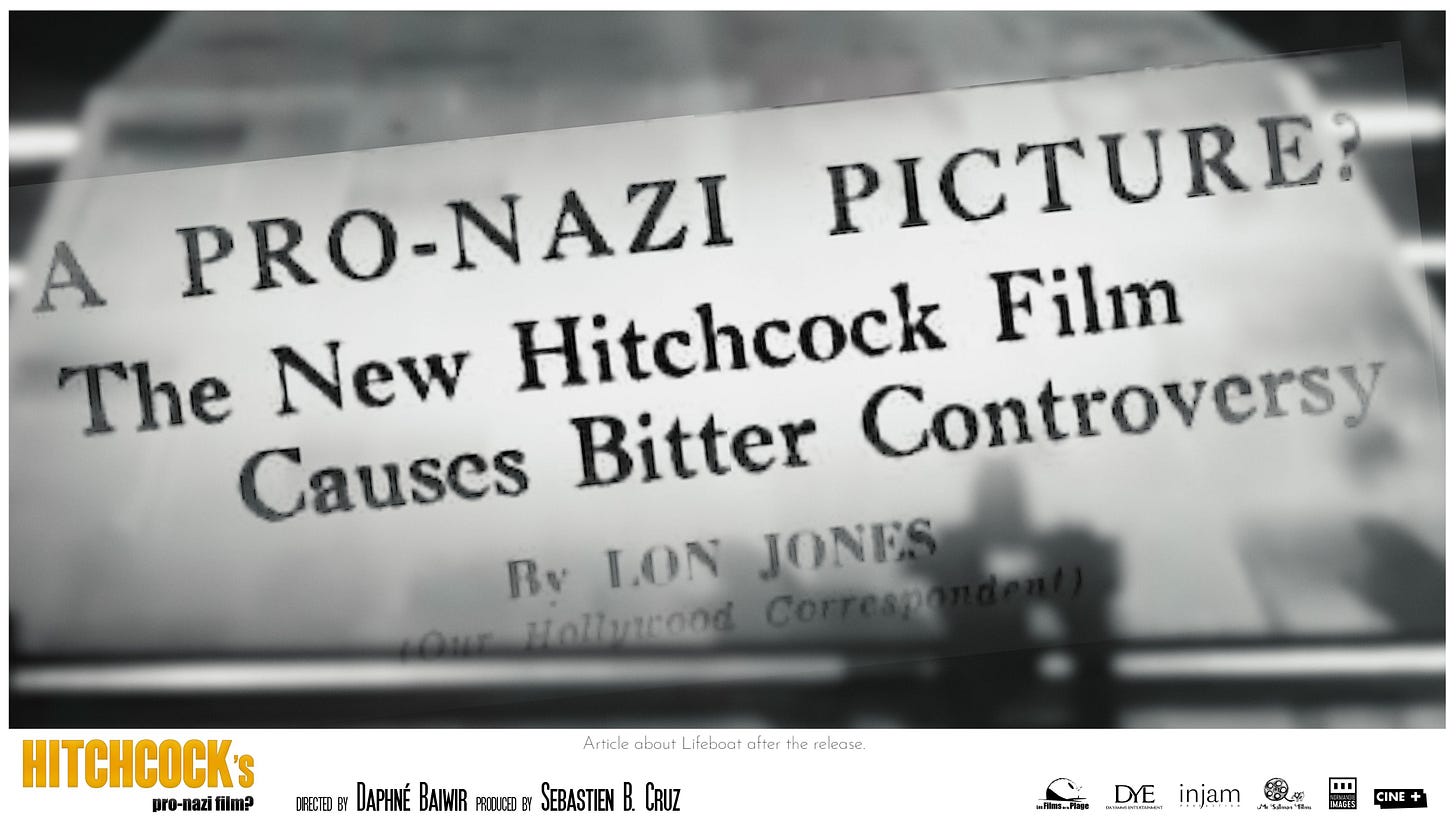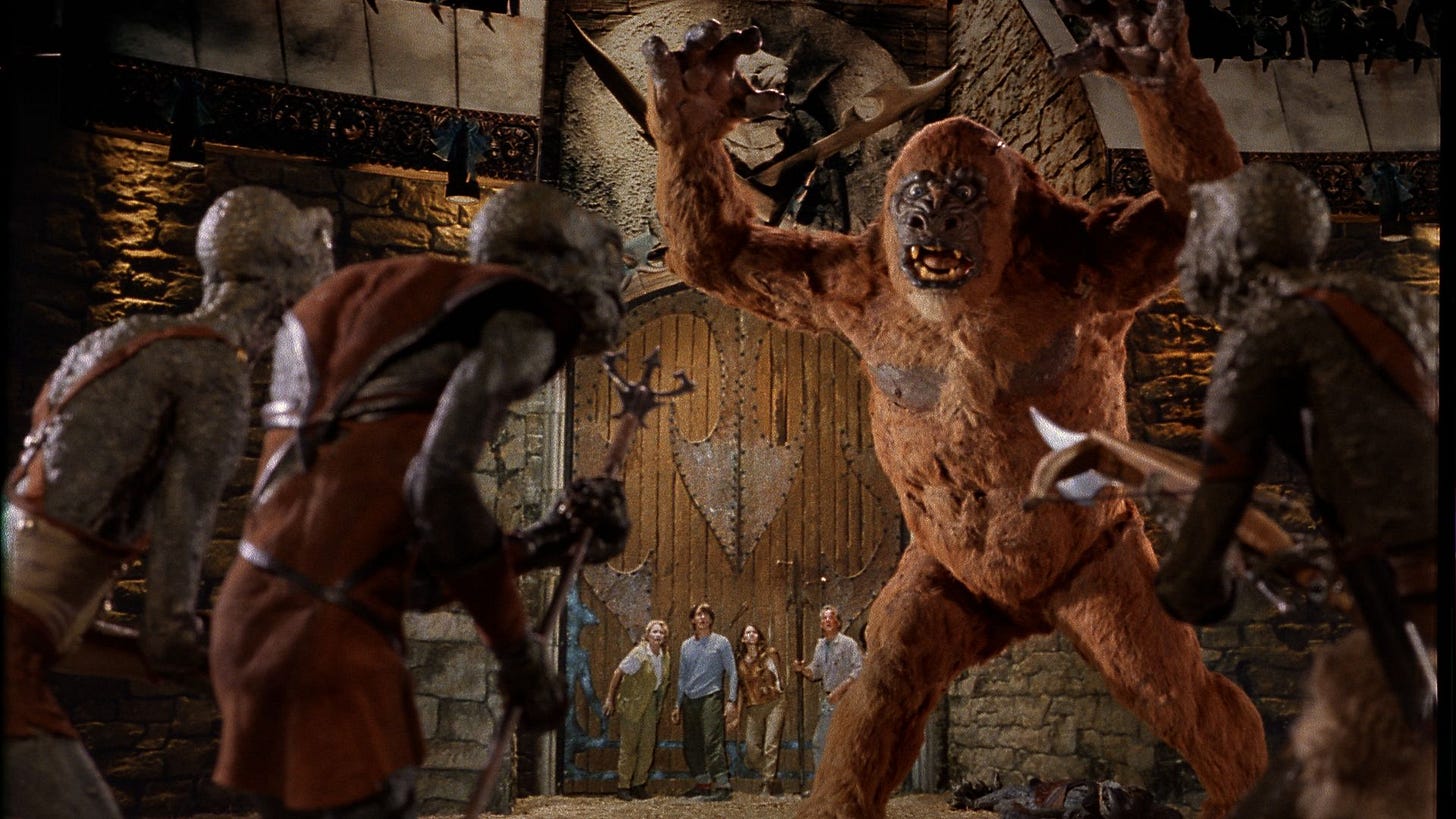C&C 42: SIFF Crime & Punishment Edition
At the festival: Elderly badasses, tired thieves, a questionable Hitchcock doc and more
The Seattle International Film Festival, celebrating its 50th anniversary this year, is currently in full swing. As usual, I’m seeking out movies that jibe with the name of this newsletter. First up, the crime portion, which included the opening night feature.
Thelma puts nonagenarian June Squibb front and center as the title character, still living independently. Then she falls for a telephone scam, sending $10,000 to someone masquerading as her grandson Danny (Fred Hechinger). Worse than losing the money is Thelma’s realization that her daughter (Parker Posey) and son-in-law (Clark Gregg) see her as diminished. The only solution: payback. To recover her cash, Thelma needs a reliable way to get around, so she “borrows” a friend’s scooter. She ends up with a partner when that friend insists on having her six. Fortunately, he’s Shaft himself, Richard Roundtree, in his final performance. Writer/director Josh Margolin’s script mines the premise for laughs while not ignoring the actualities and indignities of aging. He cannily integrates technology into the story and sets up interesting generational parallels as Danny wrangles with the helicopter tendencies of his own parents; Hechinger has a memorable parking lot meltdown, bemoaning his inability to do math and lack of life skills. It’s a crowd-pleaser—who doesn’t want to hear you can still start some shit in your 90s—and a well-done one. Squibb is a delight, and Roundtree bows out like a king. Margolin based the lead on his own grandmother Thelma; his grandfather is director Ted Post, whose credits include Beneath the Planet of the Apes (1970), the Dirty Harry sequel Magnum Force (1973), and Chuck Norris’s Good Guys Wear Black (1978), and I’m fairly sure that’s Post appearing in video footage as Thelma’s late husband.
Scorched Earth (Verbrannte Erde, Germany) is the kind of stripped-down heist movie they rarely make anymore. Catching its North American premiere, I thought I’d stumbled into an unannounced adaptation of one of the Parker novels written by Richard Stark, aka Donald E. Westlake, a mood compounded by the film’s star, Mišel Matičević of Babylon Berlin, being a damn-near dead ringer for Shane Black, who is currently making the latest Parker movie, Play Dirty.


Writer/director Thomas Arslan swiftly establishes the isolated existence of Matičević’s veteran thief Trojan, full of lonely night drives and anonymous hotel rooms. Trojan’s been in the game too long, reduced to pulling bullshit solo jobs because all of his contacts are dead, in jail, or, worst of all, gone straight. An old pal who’s now coaching youth soccer but still savvy enough to sit side by side so they don’t appear to be talking puts him in touch with a middleman organizing the theft of a painting from a museum. Trojan won’t get to pick the crew but he’s willing to work with the pros involved, even if he doesn’t completely understand what they need the computer guy for. The caper comes off without a hitch—until the rich man behind it refuses to pay for services rendered. Trojan and his cohorts square off against the cheapskate’s muscle while trying to middle the artwork back to the museum through a slippery lawyer. Scorched Earth never turns into a John Wick-style killstravaganza. It’s a quiet, methodical movie about competent and occasionally ruthless people setting about their business and trying not to get screwed. Here’s hoping it gets picked up for distribution, because I want to see it again.
Not to keep banging this drum, but I go to film festivals not in search of esoterica but to see the kind of movies that Hollywood once routinely cranked out. Movies like Scorched Earth and the compelling Argentine thriller The Extortion. A commercial airline pilot nearing retirement (Guillermo Francella) is called on the carpet by the country’s intelligence service. They’ve stumbled onto one or two of the captain’s dirty secrets, and use this information to strongarm him into “assisting” them. Of course, they’re only telling him part of the story. Francella delivers a barbed portrait of male vanity, his character forever acting like he’s on the flight deck no matter where he is. Executive produced by Juan José Campanella, who made one of my favorite films of this century, the Oscar-winning The Secret in Their Eyes (2009), also with Francella.
The question mark does a lot of heavy lifting in the title of Hitchcock’s Pro-Nazi Film? (France). The telltale punctuation is dropped for the closing credits, director Daphné Baiwir apparently believing she’s made her case against Hitch’s Lifeboat (1944). That’s quite a flex considering she doesn’t bother marshaling her argument until the halfway point. Prior to that, the documentary offers a sturdy précis of Alfred Hitchcock’s early work and arrival in Hollywood, followed by a summary of John Steinbeck’s career before he was approached to write the film’s story, as 20th Century Fox felt the name of a prestige author in the credits would bolster the project’s prospects. The tale of a motley group of people adrift in the title conveyance after their ship is torpedoed by a U-boat who then rescue a German crewman is initially presented—and still largely viewed—as one of Hitchcock’s “trick” films like Rope (1948), the director embracing the challenges of a confined-space thriller set on the open water. Finally, Baiwir gets to the controversy, a context-dependent dustup based on the charge levelled against the film by some critics at the time that it offered a “positive” depiction of its Nazi villain while the American and British characters squabble amongst themselves. Columnist Dorothy Thomson led the campaign without ever twigging that Tallulah Bankhead’s character was inspired by her. Hitch’s crime amounts to giving rein to his commercial instincts and making a thriller with a formidable adversary. The pro-Nazi charge smacks of sensationalism, especially given Hitch’s history; he’d already made Foreign Correspondent (1940), with its stirring, Ben Hecht-scripted closing speech that flew in the face of America’s supposed neutrality, as well as Saboteur (1942); he returned to the UK in 1943 to make two French-language propaganda films; and he would later contribute to a British documentary about the liberation of Nazi concentration camps. That Baiwir acknowledges this track record only undermines her half-hearted thesis. There’s far more compelling material in Hitch’s removal of the progressive elements of Steinbeck’s story, earning the author’s enmity, as well as his transformation of Canada Lee’s merchant seaman—the only significant Black character in a Hitchcock film—into a stock figure. The exercise is a footnote inflated into a feature.
Lastly, The Primevals from Charles Band’s Full Moon Entertainment isn’t a crime film, and its backstory is more engaging than the finished product. The movie was initially conceived by stop-motion animator David Allen in the late 1960s, went into production in 1978 and then again in 1994, and was completed decades after Allen’s death via crowdfunding. (At one point, Hammer Films was involved, their interest morphing into a second project that was never made with the proposed title Zeppelin vs. Pterodactyl. I propose somebody use that title at once.) The Primevals is an unironic, note-perfect recreation of vintage creature features right down to the long-winded explanations from scientists, one of them played by Robert Cornthwaite, the chief egghead in The Thing from Another World (1951), who died in 2006. Its plot has elements familiar from every Indiana Jones adventure and Stargate (1994) among many others, but you can’t accuse a movie of ripping off films that it predates. And when it ends with a stop-motion yeti battling hordes of stop-motion aliens in a subterranean city in the Himalayas while hominids outfitted at a Land of the Lost yard sale look on, I’m not gonna complain.
What I’m Reading
Ray Banks pays proper tribute to the late Roger Corman, whom film historian Mark Harris correctly described as “the last founding father.”
Jason Diamond, in rare form, on how we have entered the era of “no-soul” food.
I’m still haunted by Brad Thomas Parsons’s essay on the hidden hazards of hospitality when you’re too big for the bar.








Another informative and useful essay Vince! Thanks…
I remember reading the fanzine CINEMAGIC in the 1970s which heavily covered David Allen and PRIMEVALS. Thanks for posting about it, I had no idea it was still in the works and now completed. To us "Monster Kids," David Allen was a special effects cult hero, starting with his King Kong Volkswagen commercial in the 1960s.